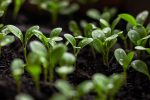
The Malabar Spinach or Vine Spinach as it is also known by (Basella alba L. family: Basellaceae) is an important, popular green leafy vegetables found commonly growing in the tropical regions of the world. If you’ve had occasion to eat it, it reminds the consumer of how many spinach like vegetables there are throughout the world’s cuisine. It makes a very handy, nutritious alternative to lettuce.
The plant is usually seen growing as a creeping vine throughout many tropical regions especially Asia. In Western Europe it tends to lose some of the creeping character, probably because it is so cold in climate. Variants grown in the greenhouse tend to grow more vigorously and are less prone to disease. The plant is often used as a substitute for true spinach (i.e. Spinacea oleracea L.) and has comparable nutritional properties (Chaturvedi et al., 2013) and it also has great ethno-medicinal importance.
There is very little toxicity associated with the plant given it wide consumption in Western African and India.
An equally important use in India associated with Ayurvedic medicine is the treatment of cancer (Shruthi et al., 2012).
The properties of the plant have been appropriately reviewed by Deshmukh and Gaikwad (2014). In the Phillipines, it is known as Alugbati.
Nutritional Value
Basella alba is a valuable source of vitamins A, C and B9, thiamine, riboflavin, niacin, minerals such as calcium, magnesium and iron, and several antioxidants. It also contains a rich source of essential amino acids such as arginine, isoleucine, leucine, lysine, threonine, and tryptophan and a low percentage of soluble oxalates (Tongco et al., 2015).
The leaves contain various carotenoids, organic acids, polysaccharides, bioflavonoids, a betacyanin, and vitamin K. It also contains numerous pharmacologically important triterpene oligoglycosides such as the basella saponins A, B, C, and D, betavulgaroside I, momordins IIb and IIc which have been isolated recently and may be responsible for various medical properties (Deshmukh and Gaikwad, 2014).
Male Sterility Benefits
As a medicinal plant, Basella alba is used by the traditional healers of the Western regions of Cameroon to improve male fertility and virility. Given that male sterility is such a confidence sapping condition for men, the availability of a naturally sourced medicine has tremendous value. Its properties highlight some of the more interesting components in the plant because it contains steroidal like components similar to testosterone. A methanol extract (MEBa) has been demonstrated to exhibit androgenic effects in Leydig cells but the action mechanism remains unclear (Moundipa et al., 2005, 2006; Nantia et al., 2012, 2013). The antioxidant properties are cited as one of the reasons for the plant’s efficacy.
Incidentally, the Leydig cells produce testosterone when signaled to by lutenising hormone (LH) using the cytoplasmic or cell surface receptors. These particular receptors may trigger genomic effects, probably by the stimulation of DNA transcription by the activated receptor, or by non-genomic effects which is coupled to signaling mechanisms that involve the kinases, protein kinase A (PKA) and protein kinase C (PKC).
One very recent study addressed the use of a fungicide called manganese ethylenebis dithiocarbamate (Maneb™) which is linked to causing male sterility in countries such as the Cameroon from which the study originated (Manfo et al., 2014). Along with another methanolic extract from the plant Carpolobia alba, both showed protective effects against Maneb™ in alleviating the fungicide’s induced impairment of male reproductive function in Wistar albino rats.
Seeds & Books On The Subject
Please note these links take you to products sold by our affiliate marketing partners.
References
Chaturvedi, N., Sharma, P., and Agarwal, H. (2013) Comparative nutritional and phytochemical analysis of spinach cultivars: B. alba and S. oleracea. Int. J. Research in Pharmaceutical and Biomedical Sciences 4(2) pp. 674-679.
Deshmukh, S. A., & Gaikwad, D. K. (2014). A review of the taxonomy, ethnobotany, phytochemistry and pharmacology of Basella alba (Basellaceae). J. App. Pharm. Sci., 4(1), pp. 153-65.
Manfo, F.P.T., Chao, W.-F., Moundipa, P.F., Pugeat, M., Wang, P.S. (2011) Effects of maneb on testosterone release in male rats. Drug Chem. Toxicol. 34(2): pp. 120-128.
Manfo, F. P. T., Nantia, E. A., Dechaud, H., Tchana, A. N., Zabot, M. T., Pugeat, M., & Moundipa, P. F. (2014). Protective effect of Basella alba and Carpolobia alba extracts against maneb-induced male infertility. Pharmaceutical biology, 52(1), 97-104.
Nantia, E. A., Manfo, P. F. T., Beboy, N. E., Travert, C., Carreau, S., Monsees, T. K., & Moundipa, P. F. (2012). Effect of methanol extract of Basella alba L.(Basellaceae) on the fecundity and testosterone level in male rats exposed to flutamide in utero. Andrologia, 44(1), pp. 38-45.
Nantia, E. A., Manfo, F. P., Beboy, N. S., & Moundipa, P. F. (2013). In vitro antioxidant activity of the methanol extract of Basella alba L (Basellaceae) in rat testicular homogenate. Oxidants and Antioxidants in Medical Science, 2(2), pp. 131-136.
Shruthi, S.D., Roshan, A., Naveen, K.H.N. A. (2012) Review on Medicinal Importance of Basella alba L. Int. J Pharmaceut Sci Drug Res. 4(2): pp. 110 – 114.
Tongco, J. V. V., Añis, A. D., & Tamayo, J. P. (2015) Nutritional Analysis, Phytochemical Screening, and Total Phenolic Content of Basella alba Leaves from the Philippines. Int. J. Pharmacognosy and Phytochemical Research. 7(5); pp. 1031-1033


How do I grow it ? I’d like to get seeds of this plant as I think it could be a useful addition to my garden. I’m not sure how successful it will be in the UK as I think it is frost prone as it were. Any advice here ?